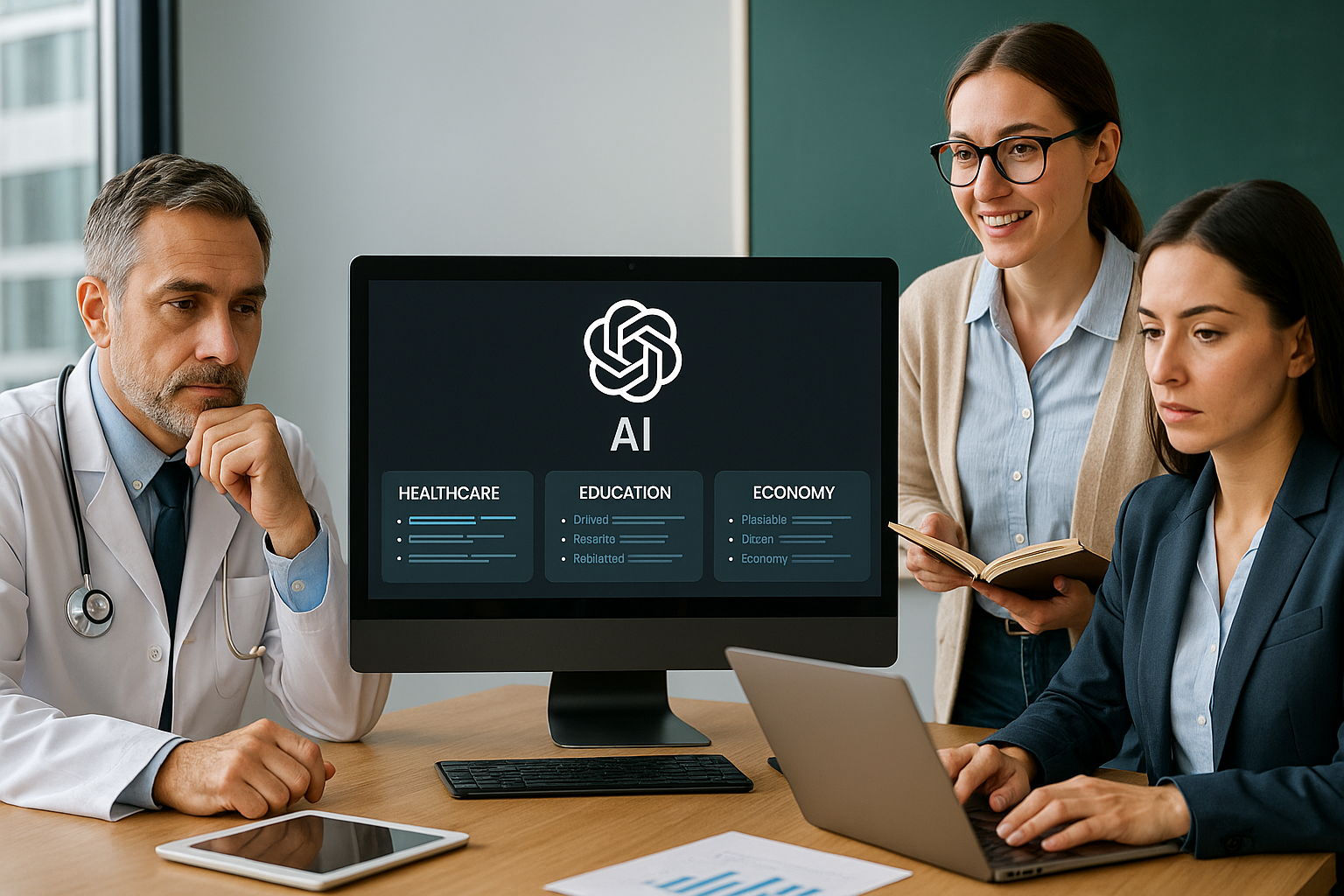Risks and rewards of ChatGPT’s rapid expansion in critical public sectors
Despite its benefits, ChatGPT's rapid proliferation is accompanied by serious ethical dilemmas. Key among them is the issue of hallucinations, AI-generated statements that are factually incorrect but presented convincingly. In healthcare, such errors could lead to dangerous misdiagnoses or faulty medical advice. In education, they risk misleading students with inaccurate learning material. In the business realm, hallucinated financial forecasts or regulatory misstatements could carry heavy consequences.

OpenAI’s ChatGPT has infiltrated almost all key public sectors - health, educational systems, and business operations. Yet behind the widespread adoption lies a more urgent story: one of unregulated risk, algorithmic bias, and structural inequality. A new study titled “ChatGPT and Digital Transformation: A Narrative Review of Its Role in Health, Education, and the Economy”, published in Digital, offers the most comprehensive cross-sectoral assessment of ChatGPT’s real-world impact to date.
The review analyzes how the large language model is reshaping operations in three critical public-facing sectors - healthcare, education, and the economy - while warning of mounting ethical and societal risks.
In healthcare, its integration into electronic health records (EHRs) and virtual care tools allows for faster medical documentation, patient triage, and simplified communication. Hospitals now embed ChatGPT to assist clinicians and communicate with patients more efficiently. Additionally, ChatGPT's use in mental health support, including therapy chatbots and reflective writing aids, has emerged as a scalable, low-cost solution, although concerns persist regarding the accuracy and safety of its outputs.
In the education sector, ChatGPT is influencing how students learn and educators teach. It functions as a tutor, essay coach, and brainstorming partner, while also being integrated into learning management systems such as Moodle and Canvas. These deployments provide automated feedback, assignment generation, and AI-assisted assessments. Its growing presence in classrooms, from primary to higher education, is prompting both curricular reforms and renewed debates about academic integrity, equitable access, and critical thinking development.
Economically, ChatGPT is hailed as a digital co-worker. Its ability to summarize reports, generate marketing content, respond to customer queries, and streamline documentation is revolutionizing small and medium enterprises and even scaling into larger corporations. Freelancers and entrepreneurs use it to write business plans and analyze data, while firms leverage it for forecasting and customer engagement. However, this diffusion is also raising alarms about automation-driven job displacement and inequitable access to AI tools across industries.
What ethical and technical risks arise from the integration of ChatGPT?
Despite its benefits, ChatGPT's rapid proliferation is accompanied by serious ethical dilemmas. key among them is the issue of hallucinations, AI-generated statements that are factually incorrect but presented convincingly. In healthcare, such errors could lead to dangerous misdiagnoses or faulty medical advice. In education, they risk misleading students with inaccurate learning material. In the business realm, hallucinated financial forecasts or regulatory misstatements could carry heavy consequences.
Privacy remains another persistent concern. Users interacting with ChatGPT - whether patients entering health data, students uploading assignments, or businesses revealing confidential plans - may inadvertently share sensitive information. These interactions can be stored or processed in ways that evade legal protections such as HIPAA or GDPR. The report stresses that without robust oversight, AI-mediated data collection could result in significant privacy violations and reputational damage.
Bias encoded in training data is a further cross-sectoral challenge. In healthcare, it may manifest as uneven diagnostic accuracy across demographic groups. In education, students from marginalized communities could receive less accurate or skewed feedback. In economic contexts, bias could taint financial recommendations or hiring support tools. These risks underscore the need for ethical triage protocols, critical AI literacy, and inclusive access strategies tailored to each domain.
Moreover, the environmental cost of large-scale AI use, including the energy and water needed to support ChatGPT’s inference capabilities, is an emerging concern. Often hidden from users, this environmental footprint adds to the urgency of developing sustainable AI governance frameworks.
What policy and research actions are urgently needed?
The review outlines a comprehensive roadmap for future research and regulation. In healthcare, research must validate ChatGPT’s clinical accuracy across diverse populations and explore privacy-preserving designs like federated learning. Investigations into how patients engage with AI tools, particularly in mental health settings, are essential to ensuring responsible use.
In education, studies must examine the long-term impact of AI on cognitive development, academic honesty, and learning equity. The review calls for investment in AI literacy curricula and the reevaluation of assessment models to align with generative technologies.
For the economy, researchers are urged to quantify productivity impacts, assess the reliability of AI-generated content, and study how organizations, especially small businesses, are adapting to AI integration. Scrutiny of labor displacement, upskilling needs, and AI governance structures is critical as ChatGPT reshapes knowledge work.
Across all sectors, the authors highlight bias mitigation, transparency, and environmental sustainability as urgent, cross-cutting issues. Institutions are encouraged to develop domain-specific usage policies, legal safeguards, and inclusive design principles to mitigate systemic risks. Moreover, there is a need to prevent the exacerbation of digital divides, ensuring that benefits do not concentrate in already advantaged institutions or geographies.
The paper calls for interdisciplinary collaboration between technologists, ethicists, educators, healthcare professionals, and policymakers. Only such concerted, multi-stakeholder efforts, it argues, can ensure that ChatGPT’s integration into digital infrastructures promotes public trust, equitable access, and ethical innovation.
- READ MORE ON:
- ChatGPT digital transformation
- ChatGPT in healthcare
- ChatGPT in education
- ChatGPT in the economy
- ChatGPT ethical concerns
- AI in healthcare communication
- AI and misinformation
- ChatGPT privacy and data security
- how ChatGPT is transforming healthcare and education
- privacy risks of ChatGPT in patient communication
- FIRST PUBLISHED IN:
- Devdiscourse










